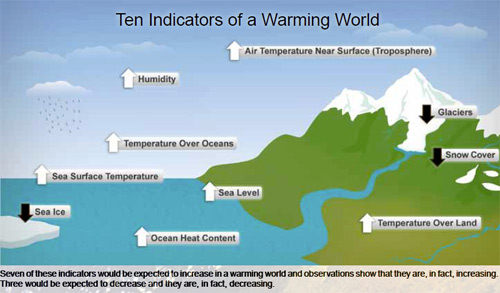10 key climate indicators all point to the same finding: global warming is unmistakable
Posted on 29 July 2010 by John Cook
A common theme expressed at Skeptical Science is that to understand climate, you need to look at the full body of evidence. To help people assess the evidence, NOAA have just published State of the Climate 2009. The report defines 10 measurable planet-wide features used to gauge global temperature changes. All of these indicators are moving in the direction of a warming planet.
Seven indicators are rising: air temperature over land, sea-surface temperature, air temperature over oceans, sea level, ocean heat, humidity and tropospheric temperature in the “active-weather” layer of the atmosphere closest to the Earth’s surface. Three indicators are declining: Arctic sea ice, glaciers and spring snow cover in the Northern hemisphere. Jane Lubchenco sums it up well:
"For the first time, and in a single compelling comparison, the analysis brings together multiple observational records from the top of the atmosphere to the depths of the ocean. The records come from many institutions worldwide. They use data collected from diverse sources, including satellites, weather balloons, weather stations, ships, buoys and field surveys. These independently produced lines of evidence all point to the same conclusion: our planet is warming."
I suggest checking out the site as it has some great resources. There's a short video introducing the report. My favourite line from this is Deke Arndt's line, "Climate trains the boxer but weather throws the punches". If you want a quick summary, jump to the press release. There's DIY Climate Indicators with interactive displays and access to data set. And of course there's the full report (6.6Mb PDF).































 Arguments
Arguments
































Now let me anticipate the immediate objection: "skeptics aren't disputing whether global warming is happening, just that humans are causing it". This is not the case. The bulk of the skeptic arguments I encounter these days are actually attacks on the surface temperature record, claims that glaciers are growing, disputes that the ice sheets are losing mass - generally attempts to cast doubt on any empirical data that indicates a warming trend.
So while there are many skeptics who agree that global warming is happening but question the cause, the bulk of energy spent by global warming skeptics is to attack the evidence for global warming. The most popular skeptic argument reported via the iPhone app since February is attacking the surface temperature record. So while I would love to move on from the issue of whether global warming is happening, the fact that the majority of skeptic activity is focused on this question prevents me.
That page showing time series of eleven different indicators is a great resource. I may do a follow-up post focusing on the content from that page. Thanks for your comment (and your work on the NOAA report).
- Is there a difference? (yes)
- Is it documented? (no)
- Does GHCN v2 have the original METAR records? (no)
- Does Weather Underground have them? (yes)
- Is the difference random? (no)
- Is it centered at zero? (no)
- Are the magnitude of adjustments comparable to the trend? (yes)
- Are adjustments supposed to be done to raw data in GHCN? (no)
These are facts. You can dispute if it's proper to label it fiddling or not. I am inclined to yield on that single point.